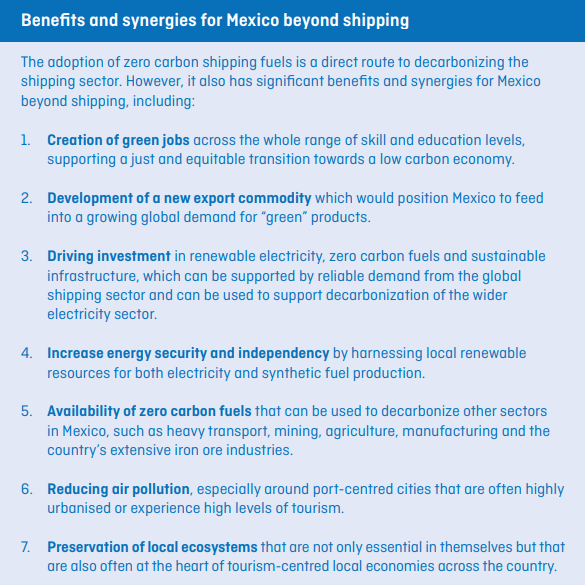With abundant renewable energy potential and access to busy shipping routes, Mexico is perfectly placed to build a valuable zero carbon shipping fuels sector, as study suggests.
In fact, a new study conducted by Ricardo and Environmental Defense Fund for the P4G Getting to Zero Coalition Partnership, explores the context and potential for the adoption of zero carbon shipping fuels through the shipping sector of Mexico. This work has an important global relevance, as the shipping sector pushes to decarbonize.
As explained, Mexico meet its decarbonization targets by catalyzing renewable energy generation supply chains, skills, and economies of scale, which support the wider adoption of new technologies. Well-placed countries like Mexico will only reap the benefits if governments and the shipping industry coordinate efforts for effective climate regulation to expedite the provision of fuels and infrastructure.
According to the report:
- Mexico has an abundance of renewable energy potential – enough to supply its domestic electrical demand as well as production of zero carbon fuels to supply commercial vessels bunkering in its ports.
- Mexico has committed to reduce GHG emissions by 22% below business as usual by 2030 and by 50% by 2050.
- Mexico has established itself as a major trading hub between North and South America and has capitalised on its access to the Pacific and Atlantic Oceans, which gives it access to Asian markets as well as access into Europe and Africa.
- Ports of Manzanillo, Cozumel and Coatzacoalcos as great examples of how different types of ports in Mexico could capitalize on a zero carbon transition. Apart from meeting decarbonization targets, the transition would diversify current port activities and create a hub for the production and export of zero carbon fuels.
- Adoption of zero carbon propulsion technologies at Mexico’s ports could attract investment of 130–188 billion pesos in onshore infrastructure by 2030.
From the study it becomes evident that Mexico may benefit in various ways from carrying a zero carbon shipping fuels sector. Apart from ensuring that the country reaches its wider decarbonization goals, locally deployed renewables can also create energy security and help catalyze the low carbon economy in Mexico by supporting decarbonization of other sectors, creating a wide range of jobs.
….states Pedro Gomez, Head of Shaping the Future of Mobility, Member of the Executive Committee, The World Economic Forum.

What is more, the study notes that Mexico has historically depended on fossil fuels as primary sources of energy for the country. Natural gas alone accounted for nearly 40% of the national energy supply mix in 2019, while solar while solar PV and wind combined contributed only 3%.
Moving forward, however, the picture might change as Mexico has legally set renewable and decarbonization targets that it is well-equipped to achieve. These include reducing GHG emissions by 22% below business as usual by 2030, 35% renewables by 2024 and an overall 50% GHG emission reduction by 2050.
The country has a wealth of available natural resources that can be channelled to not only decarbonize electricity generation, but also to produce electrofuels such as hydrogen and ammonia that could help decarbonize other sectors and applications such as industry, which makes up over 30% of the country’s Gross Domestic Product (GDP).
Hydrogen is already consumed in Mexico in oil refining and the iron and steel industries. With the decline of oil reserves and onshore wells, alongside the high cost of offshoreextraction, Mexico has already began looking at new sources of primary energy sources.
The Mexican hydrogen group Asociación Mexicana de Hidrógeno (AMH), formed in 2021, brings together energy companies, energy trade groups and agencies. Their aim is to develop a national hydrogen plan.
Mexico’s access to busy trading routes has made it a major trading hub. This makes Mexico an advantageous location to establish a zero carbon shipping sector, as the many international vessels bunkering in Mexican ports need to be able to refuel along their journey.
…states Ingrid Sidenvall Jegou, Project Director, Global Maritime Forum.






























































